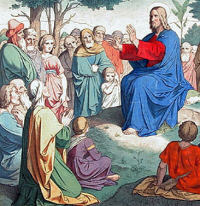» Enjoy our Liturgical Seasons series of e-books!
"I give you a new commandment, says the Lord: love one another as I have loved you. "The same mercy which obliged Jesus, innocent as he was, to take upon himself all the crimes of the human race, also obliged him, happy as he is, to take upon himself all our miseries. Just as the most innocent has borne the most sin, so too the most bountiful suffers the most need. He is hungry and he is thirsty; he groans in chains; he labors under maladies; he suffers both heat and cold at one and the same time. Truly poor he is the poorest of the poor, because all other poor persons simply suffer themselves while there is only Jesus Christ who experiences all that men suffer. — Jacques Bossuet
Love Changes the World Without Making Noise
This Sunday's Gospel has one of the most typical, yet most difficult, teachings of Jesus: Love your enemies (Luke 6:27).
It is taken from the Gospel of Luke, but it is also found in Matthew's Gospel (5:44), in the context of the programmatic discourse that begins with the famous Beatitudes. Jesus delivered this address in Galilee, at the beginning of his public ministry: It was something of a "manifesto" presented to everyone, which Christ asked his disciples to accept, thus proposing to them in radical terms a model for their lives.
But what is the meaning of his teaching? Why does Jesus ask us to love our very enemies, that is, ask a love that exceeds human capacities? What is certain is that Christ's proposal is realistic, because it takes into account that in the world there is too much violence, too much injustice, and that this situation cannot be overcome without positing more love, more kindness. This "more" comes from God: It is his mercy that has become flesh in Jesus and that alone can redress the balance of the world from evil to good, beginning from that small and decisive "world" which is man's heart.
This page of the Gospel is rightly considered the "magna carta" of Christian nonviolence; it does not consist in surrendering to evil — as claims a false interpretation of "turn the other cheek" (Luke 6:29) — but in responding to evil with good. (Romans 12:17-21), and thus breaking the chain of injustice. It is thus understood that nonviolence, for Christians, is not mere tactical behavior but a person's way of being, the attitude of one who is convinced of God's love and power, who is not afraid to confront evil with the weapons of love and truth alone. Loving the enemy is the nucleus of the "Christian revolution," a revolution not based on strategies of economic, political or media power. The revolution of love, a love that does not base itself definitively in human resources, but in the gift of God, that is obtained only and unreservedly in his merciful goodness. Herein lies the novelty of the Gospel, which changes the world without making noise. Herein lies the heroism of the "little ones," who believe in the love of God and spread it even at the cost of life.
Dear brothers and sisters: Lent, which begins this Wednesday, with the rite of the distribution of ashes, is the favorable time in which all Christians are invited to convert ever more deeply to the love of Christ.
Let us ask the Virgin Mary, the docile disciple of the Redeemer, to help us to allow ourselves to be conquered without reservations by that love, to learn to love as he loved us, to be merciful as our heavenly Father is merciful (Luke 6:36).
— Benedict XVI, Angelus Address, Feb. 18, 2007
Things to Do:
- Teach your children the seven spiritual works of mercy, as follows: instruct the ignorant; counsel the doubtful; admonish sinners; bear wrongs patiently; forgive offenses willingly; comfort the afflicted; pray for the living and the dead. Discuss these with your children, asking them for some ideas on how they could practice these works (especially in the family) in their daily lives. Focus on the two mentioned by Our Lord in today's Gospel — to bear wrongs patiently and forgive offenses willingly.
- St. Paul's reading argues that the resurrected body does exist ("So shall we [someday] bear the likeness of the man from Heaven"). Tell your children about the doctrine that our bodies will be resurrected at Christ's final coming. Discuss the characteristics of a glorified body. (This could be fun!) Be sure to read the Catholic Encyclopedia's discussion of General Resurrection, especially the section on the Characteristics of the Risen Body. For a more interesting approach, children who are not too young can universally appreciate the seventh book of the C.S. Lewis' Chronicles of Narnia, The Last Battle, much of which concerns the characters' experience of Paradise, the new Heaven and Earth.
- This is the last Sunday before Lent! Here are two family activities that will help you and your children get into the Lenten mindset in the next three days before Ash Wednesday: the solemn Palm Burning and a ceremonious Farewell to Alleluia.







